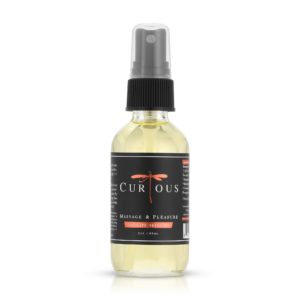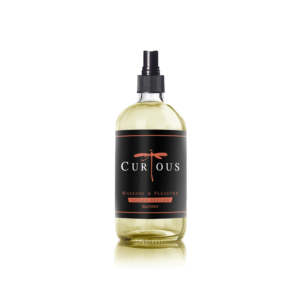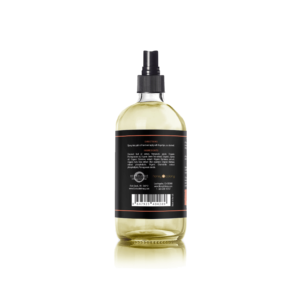Women: Is Your Vagina The Healthiest It Can Be?
An estimated 21 million women between the ages of 14 and 49 suffer from bacterial vaginosis (BV) – an overgrowth of harmful bacteria.
BV is associated with a higher risk of STD transmission and complications in pregnancy, including pre-term delivery and low-birth-weight babies. (1)
Symptoms of BV include itchiness, burning, odor, and discharge. Many women may not be aware that they have BV, which is essentially caused by an imbalance of bacteria.
This is when there is not enough of the good bacteria (lactobacilli) and too much of the “bad” bacteria (Gardnerella vaginalis, Mycoplasma hominis, Ureaplasma urealyticum and anaerobes).

While it’s not uncommon for many women to experience episodes of vaginal dryness and infections, it’s not something you have to just live with.
Yeast infections are another common problem. The Mayo Clinic estimates that three out of four women will at some point suffer from a yeast infection (2), usually caused by Candida overgrowth, exacerbated by diet and environmental factors, including products, such as personal lubricants, women use.
When your vaginal pH goes awry, odor-causing microorganisms and infections can flourish. Studies show that vaginal problems are more likely to occur when vaginal pH is unbalanced. (3)
Why Having a Balanced pH is so Important
pH tests determine the level of acidity. A lower score means a more acidic environment. A normal pH level for the vagina according to experts, is between 3.8 and 4.5. (3) Lactoballi, the “good” bacteria, thrive at lower levels, and produce hydrogen peroxide and lactic acid, keeping the vagina at a healthy pH.
Higher pH levels, usually referred to as imbalanced because the environment is more alkaline, is often equated with infections and other problems. It is at these levels that bacteria and yeast will grow

Imbalanced pH and vaginal irritation and dryness can also be caused by scented soaps, tampons, douching, antibiotics, and hormonal fluctuations, including those caused by birth control pills and hormone-releasing IUDs.
To top it off, semen can also contribute to putting pH levels out of whack.
Maintaining healthy vaginal flora is therefore imperative. It starts with a healthy, balanced diet and lifestyle.
✔ Think twice before you douche, which can alter the vagina’s natural chemistry;
✔ Visit your gynecologist regularly;
✔ Take probiotics, especially if you’ve taken antibiotics frequently, to help ensure the good bacteria in your body flourishes; and
✔ Throw away commercially produced lubricants. They could actually be affecting your body chemistry.

Unfortunately, many personal lubricants contain ingredients that aren’t meant to be introduced into the body, especially our most sensitive areas.
These include:
- Glycerin and glucose, which can feed candida, which in turn may contribute to the risk of yeast infections.
- Phenoxyethanol. This additive, when found in high concentrations, can affect the reproductive system, the central nervous system, and the immune system.
- Chlorhexidine and propylene glycol. These substances, found in many of the more popular commercial lubricants, are irritating for some women.
- Petroleum or petroleum-derived ingredients. These literally suffocate your skin, and are thought to be possibly cancer-causing.
- Parabens. These are linked to breast cancer for their estrogen-mimicking properties.
- Silicone oils. These include dimethicone, highly polymerized methyl polysilozane, methyl polysiloxane, mirasil DM 20, and viscasil 5M. Is that really what you want in your intimate zones? Like petroleum, these oils can hamper your skin’s natural ability to breathe.
In addition to taking a holistic approach to your health, including eating a healthy diet, reducing exposure to toxins, and keeping stress levels in check, make sure any products you use – especially lubricants – are helping, not hurting the delicate pH balance in your body.
Many women are doing all they can and still need help with vaginal dryness
Women and their partners need and deserve a lubricant that will not only be non-irritating, but one that will add to the overall health of their most intimate areas.
The solution is to turn to natural, organic ingredients that have a long history of nourishing female genital health. The latest research on nature’s pharmacy shows there are many naturally-occurring oils and botanicals that can help, including:
Coconut fruit extract. Coconut fruit extract is an exceptionally silky, non-greasy oil extract that improves barrier function without harmfully coating the vaginal epidermis.
Coconut fruit extract is a multifunctional ingredient that uses steam extraction to eliminate the long chain triglycerides that cause oil to crystallize and separate. It decreases water loss via the mucosal membranes, transforming dry, irritated and inflamed surfaces into soft, hydrated tissues.
Studies indicate coconut fruit extract is anti-inflammatory, antimicrobial, and is an antioxidant.
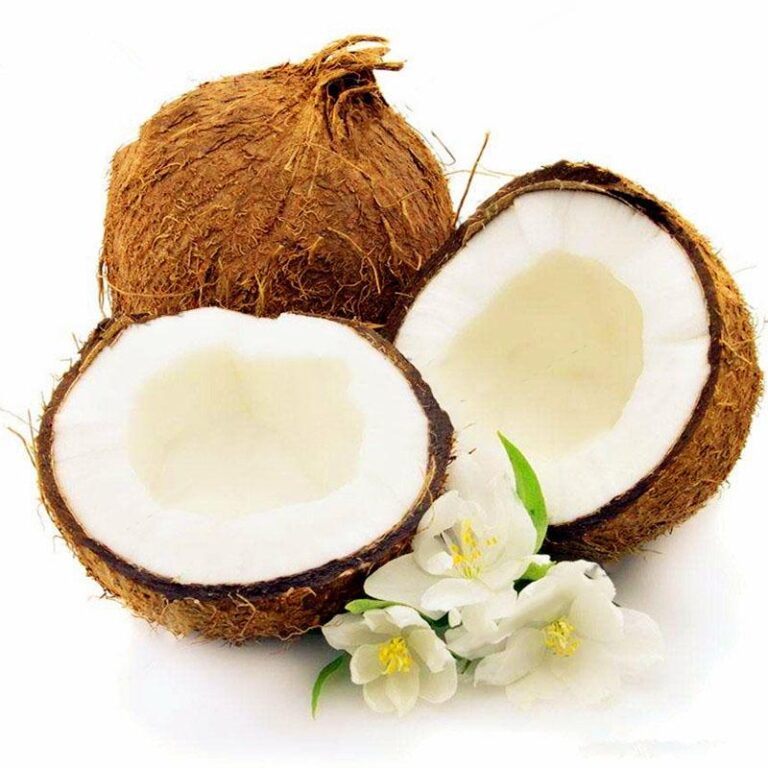
Coconut fruit oil is similar to coconut MCT oil, with a high concentration of medium chain triglycerides (MCT) and non-estrogenic phytosterols. MCTs are more efficiently metabolized than LCTs (long-chain triglycerides) because they cross the double mitochondrial membrane rapidly and do not require carnitine (a compound needed for metabolism).
This rapid metabolic conversion of MCT into cellular energy increases absorption of vitamins, minerals, and amino acids and serves to protect, maintain, and restore sensitive tissues. MCT meaningfully penetrates the epidermis in neonates (used to increase weight gain via massage in underweight and premature infants) and through mucous membranes.
-
-
Pomegranate (Punica granatum) seed oil. This oil contains 70 percent punicic acid, a valuable omega-5 fatty acid that reduces inflammation and aids in cellular repair.
-
Pomegranate seed oil also high in antioxidants — higher than red wine, and similar to that of green tea — and notably promotes collagen and elastin production. High-quality, organic pomegranate seed oil improves elasticity and allows for old skin to slough off more quickly, increasing vaginal health.

A by-product of pomegranate, lactic acid, as mentioned before, is important in maintaining pH levels. Lactic acid is critical in maintaining the desired pH that keeps our tissues healthy and our ecosystem balanced.
DID YOU KNOW?
The pomegranate, a potent symbol in Greek myth, is associated with sensuality, sexuality and love. The Greeks have long known of its remarkable properties to nourish a healthy vagina as well as to enhance sexual pleasure. Tap into the ancient secrets of pomegranate to nourish your body and enrich your sex life.
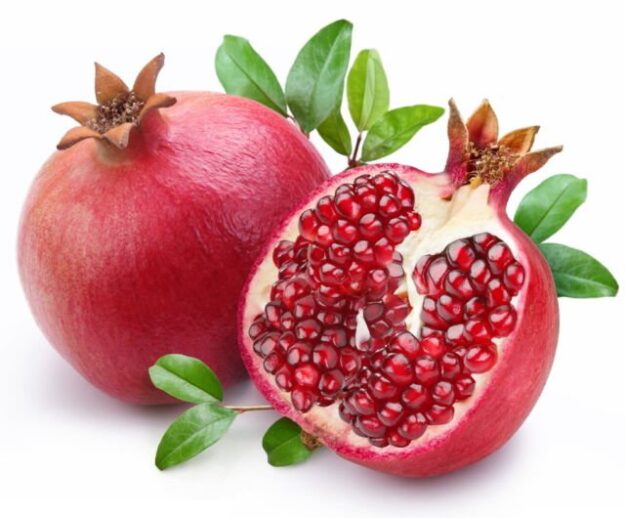
- Pomegranate (Punica granatum) sterols. Additional sterols to those already present in the pomegranate oil optimize the barrier and hydration effect. It is deeply moisturizing. According to the British Pharmacopoeia, pomegranate sterol has a remarkable hydration potential, far exceeding
Green tea extract (Camellia sinensis). You may have heard that green tea is high in antioxidants. Organic green tea extract is exceptionally high in antioxidant polyphenols, which scavenge free radicals that otherwise increase the risk of many cancers and accelerates the aging processes.
Studies indicate green tea extract can help in the treatment of cervical dysplasia and cervical cancer when applied topically, which makes it a great addition to an intimate moisturizer.
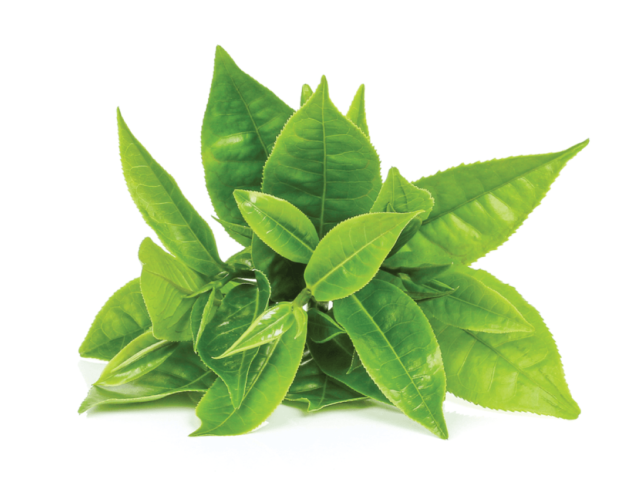
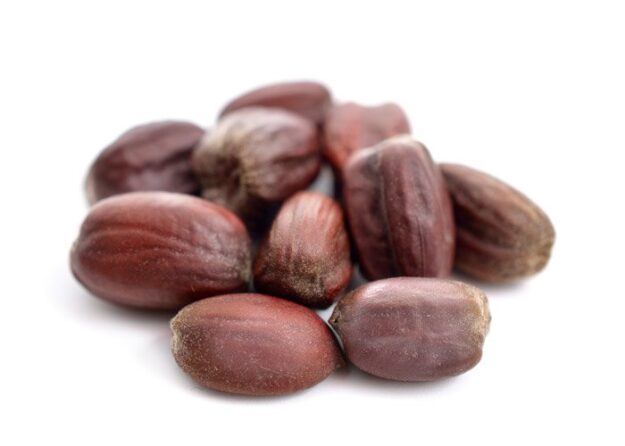
-
-
Jojoba oil (Simmondsia chinensis). This is an oil extracted from the seed of a desert shrub that grows in the American southwest and Mexico.
-
Noted for its light feel, jojoba oil has a history of traditional use in skincare as well as therapeutic applications. Its make-up is very close to human oils and it won’t clog pores. Jojoba oil has also been found to combat inflammation while reducing scar formation.
Elderberry (Sambucus Canadensis) extract. Elderberry helps combat yeast overgrowth, responsible for the vast majority of urinary tract infections (UTIs).
Phytonutrient-rich with potent anti-inflammatory and antioxidant properties, the bioflavonoids in elderberry also help tighten loose skin and reduce wrinkles.
In addition, the organic fatty acid helps fight against the fungal and bacterial organisms that are problematic for women in terms of both general vaginal health and sexual health. Additional research also indicates its positive action against herpes simplex virus.

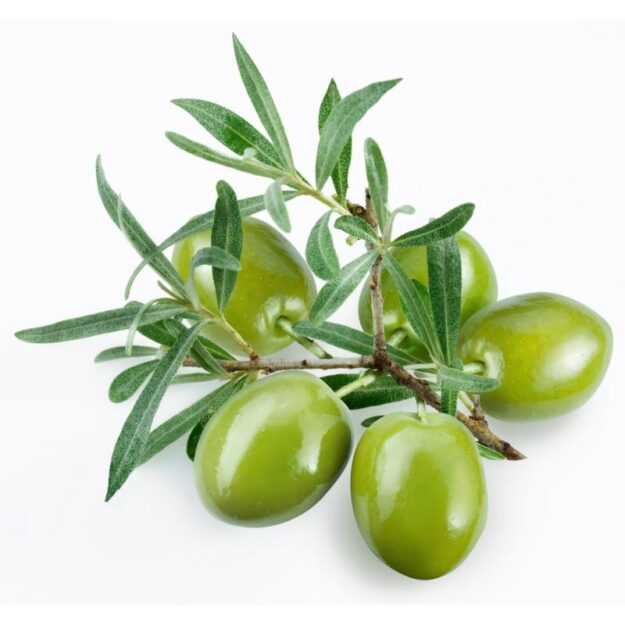
Olive (Olea europaea) squalane. This oil is one of the most common lipids produced by human skin cells. Squalane is an excellent addition to moisturizers because of its light, silky feel.
Historically, squalane was extracted from shark liver and highly prized first in Japan and Asia, and then in luxury skin care for the elite in Europe. Squalane is now extracted from plant sources, including olive oil.
In addition to its moisturizing properties and remarkable silkiness, squalane is also used in treating skin disorders such as seborrheia, dermatitis, acne, psoriasis, and atopic dermatitis.
Damiana (Turnera diffusa). This herb, harvested from a wild bush that grows in Mexico, Central America, and the West Indies, has traditionally been used as an aphrodisiac. It’s also thought to help with pelvic stagnation of blood and has been used for the treatment of ovarian cysts, fibroids, and confused menses.
Damiana was traditionally used in Mayan medicine to increase c clitoral sensitivity, and as a treatment for anorgasmia in women. The herb also stimulates sexual behavior in sluggish/ impotent males.
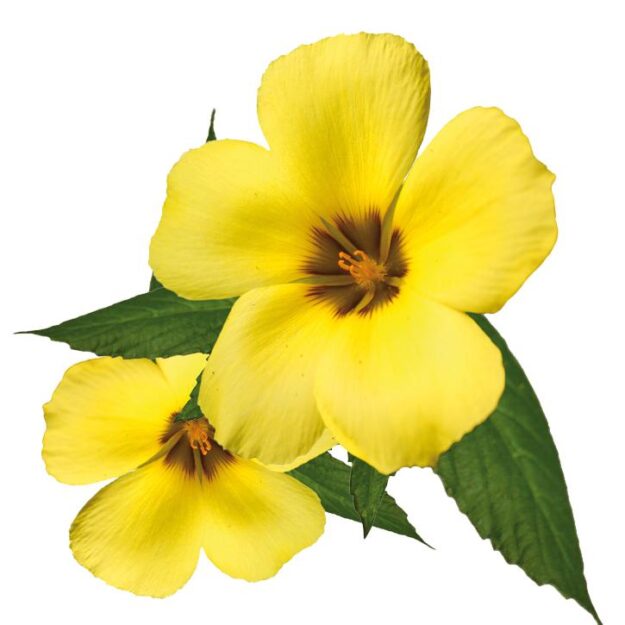
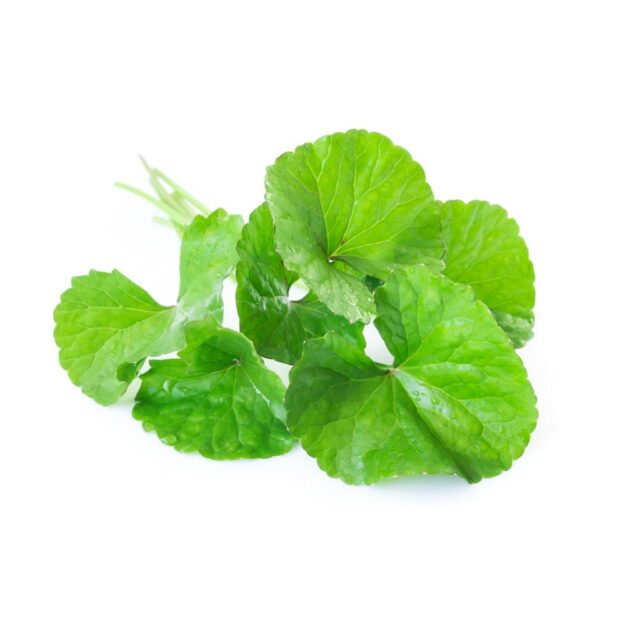
Gotu Kola (Centella asiatica). This herb native to Asian wetlands is specifically used against inflammatory or tissue disorders that are hot, red, and inflamed. Gotu Kola is effective for mucous membrane support in general, and particularly for those who struggle with dry, atrophied tissue commonly found with autoimmune conditions.
Gotu Kola is also used as a topical treatment for vulvodynia, a painful condition quietly suffered by many women. It has antiviral properties against herpes virus and may be used topically for this purpose.
Gotu Kola has traditional use in formulas increasing sexual capacity and desire. A recent study also indicates that it is a topical free radical scavenger with anti-inflammatory properties.
- Shiitake (Lentinula edodes) mushroom. Shiitake mushroom extract is an excellent source of nutrition to the skin. The zinc alone helps bolster our immune system. It’s packed with antioxidant properties and is also used against cancerous lesions and tumors, and research indicates it to be useful for some cancers.
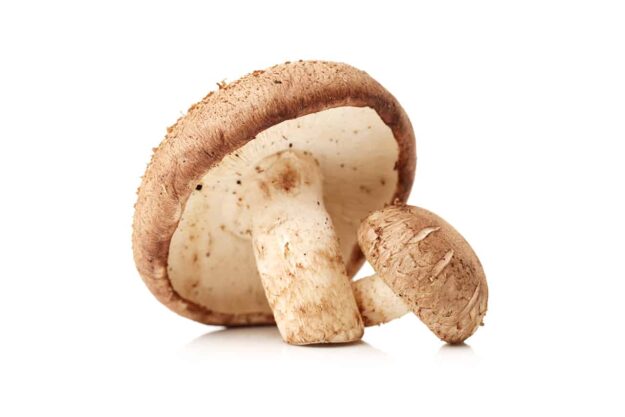
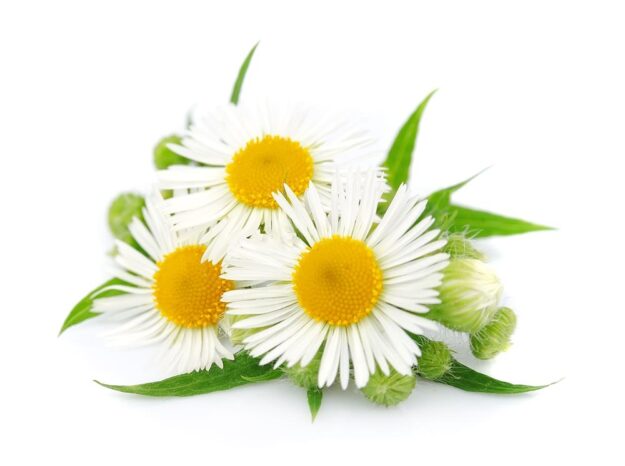
Chamomile (Matricaria recutita). You may already sip this as a tea for its calming effects. But did you know that topically it’s also used to treat anal-genital irritation, specifically hemorrhoids, vaginal membranes, and episiotomy (the surgical cut made at the opening of the vagina during childbirth)?
The good news is there’s now a specially formulated intimate moisturizer that combines all these stellar ingredients into one: CURIOUS
new
Curious
the best lubricant in the universe
Plant Medicine For Your Yoni. Intimate Massage & Pleasure Moisturizer
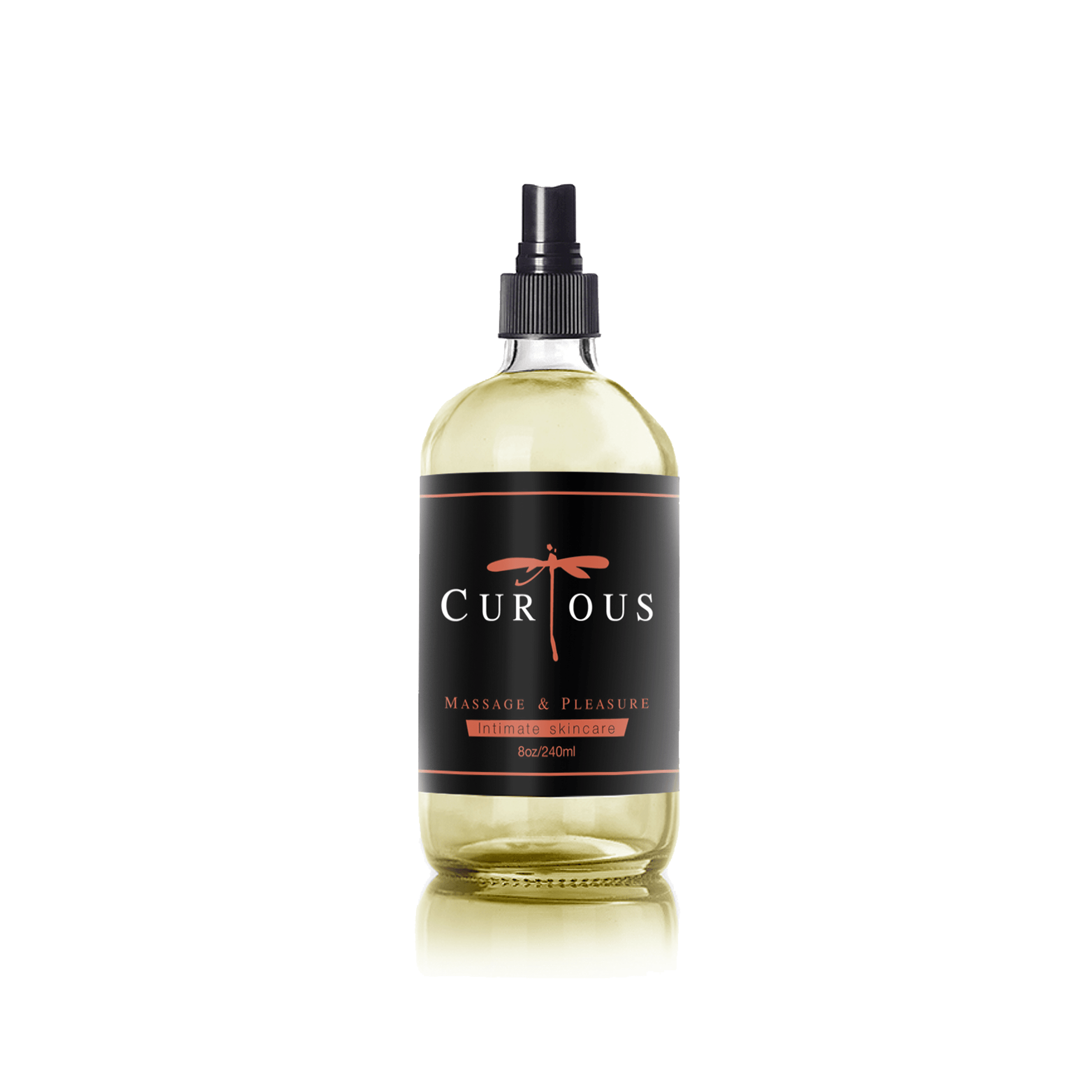
Potent organic medicinal plants
Supports woman’s intimate physiology
Preserves a Woman’s PH
Curious Intimate Moisturizer is specially designed to support the healthy function of a woman’s intimate physiology while acknowledging the fragile relationship between cellular health and a balanced microbiome.
This is accomplished using exclusively natural oils and botanical extracts, and there simply is no silkier, lighter, more natural product available to not only help you achieve pleasure, but also to help keep your vagina healthy.
Unlike many personal lubricants currently on the market, Curious Intimate Moisturizer does NOT contain potentially toxic and cancer-causing ingredients.
Curious provides an entourage of plant-sourced oils and botanicals that work synergistically and provide an environment for a healthy pH level to flourish.
Curious comes to us from HoneyColony, a site founded by journalist and functional medicine coach Maryam Henein, director of the award-winning documentary The Vanishing of the Bees.
It was co-branded with the visionary skills of Elizabeth Moriarty, Master Clinical Herbalist, owner of HERBOLOGIE and formulator of Superior Hemp Oil.
HoneyColony is dedicated to using the best, toxin-free ingredients from nature to enhance the body’s natural systems and to help you achieve the highest level of pleasure while also nurturing yourself.
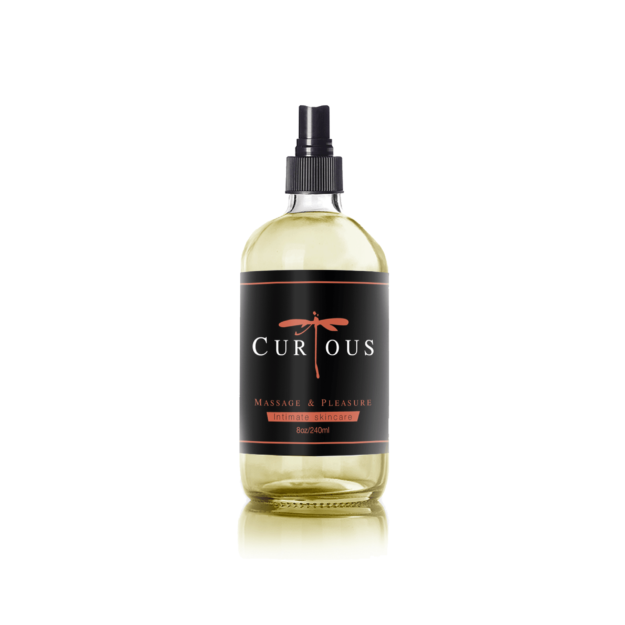
Curious is silken to the touch, so that when you massage alone or with company, the slip and glide allows you unbridled pleasure. The impulse is to think it won’t last—but it does! And it’s not messy like other, commercially-made lubricants.
Unlike toxic mainstream lubricants, which can cause pH imbalance and infections, Curious contains naturally occurring ingredients that balance pH and actually help fight infection, including chamomile, pomegranate, gotu kola, and damiana. This is particularly important for women who are susceptible to UTI’s or BV post-romp.
Curious boasts uncompromised therapeutic value and quality while also understanding your desire for sexual pleasure.
BENEFITS OF CURIOUS
✔ Convenient travel size that is carry-on compliant
✔ Provides cellular structural support and therapeutic phytonutrients
✔ Rejuvenates, nourishes, and supports intimate tissues
✔ Aids in cellular repair
✔ Improves sexual pleasure
✔ Naturally balances pH
✔ All ingredients are GMO free
✔ Fights fungal and bacterial organisms that reside in the vagina and cause harm
✔ Versatile for both internal and external massages
✔ Vegan (100 percent plant sourced)
✔ Gluten-free
✔ Not tested on animals
Curious is the only lubricant on the market to include an array of potent medicinal plants that have been shown to rejuvenate, nourish, and support intimate tissues while improving sexual pleasure.
You can trust Curious.
Here’s what our customers have to say about Curious:
“I ran across tons of “natural” lubricants that DID NOT WORK and wasted lots of money. Finally ran across Curious, read the reviews, it was pricey but I was desperate and figured I give it a try. Folks, this is worth the money! It has brought my sex life back to the max after years of pain. I’m feeling comfortable again just even sitting in an office chair and being able to dance and exercise has brought me happiness! Buy this wonderful product, you won’t regret it. It works!”
“This therapeutic oil really works for what i’d been suffering for years, vaginal dryness and dyspareunia. It’s gentle and silky, glides smoothly internally. It doesn’t irritates my intimate part at all. It gives you the right silkiness to prepare your intimate part for intercourse, and lessen the pain. Since it’s also edible, i used it for body massage as well. My partner loves it too. Wish i found this product earlier. Thank you so much. This product is totally recommended.”
Use for Intimate Massage:
Curious is sold in two sizes. Spray into palm of hand and apply with fingertips, as desired. One or two pumps is just right for intimate moisture.
For sex, the same amount is enough to begin, and research shows that many women just need to feel some wetness to remind their bodies to begin self-lubricating. Sometimes a long session requires some added juice to keep going. Three or four pumps of the sprayer is good for playtime.
Each spray is approximately .2 ml, so each 2 oz bottle contains 300 sprays, while the 8 oz contains 1,200 sprays.
Curious is edible, but without fragrance or flavors to interfere or announce itself. The best product is one that allows you to forget it’s there. It feels natural, because it’s FOR REAL.
GET CURIOUS
-
Curious Intimate Moisturizer 2oz
$38.88 – $96.50Price range: $38.88 through $96.50Rated 4.83 out of 5
Save 15% w/ code: 15Curious
-
Curious: Organic, Natural Lubricant & Intimate Massage Moisturizer
$75.50 – $212.75Price range: $75.50 through $212.75 — or subscribe to save 5%Rated 4.76 out of 5
Save 15% w/ code: 15Curious
